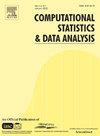贝叶斯优化顺序代理(BOSS)算法:针对广泛的贝叶斯层次模型的快速贝叶斯推理
IF 1.6
3区 数学
Q3 COMPUTER SCIENCE, INTERDISCIPLINARY APPLICATIONS
引用次数: 0
摘要
基于拉普拉斯近似和正交的近似贝叶斯推理在拟合潜在高斯模型(LGM)方面的效率越来越高。然而,许多有用的模型只有在某些条件参数固定的情况下才能拟合为lgm。这样的模型被称为条件lgm,其示例包括变化点检测、非线性回归等。现有的拟合条件LGMs的方法依赖于网格搜索或基于抽样的方法来探索条件参数的后验密度;两者都需要对条件参数的非归一化后验密度进行大量的评估。由于每次求值都需要拟合一个单独的LGM,因此这些方法在计算上超出了简单场景的限制。本文介绍了贝叶斯优化序列代理(BOSS)算法,该算法将贝叶斯优化与近似贝叶斯推理方法相结合,大大减少了拟合条件lgm所需的计算资源。与现有方法相比,BOSS的评估次数少了几个数量级,有效地生成了序列设计点,这些设计点捕获了大部分条件反射参数的后验质量,随后产生了一个准确的替代后验分布,可以很容易地归一化。通过广泛的模拟研究和在流行病学、环境科学和天体物理学中的实际应用,证明了BOSS的效率、准确性和实用性。本文章由计算机程序翻译,如有差异,请以英文原文为准。
Bayesian optimization sequential surrogate (BOSS) algorithm: Fast Bayesian inference for a broad class of Bayesian hierarchical models
Approximate Bayesian inference based on Laplace approximation and quadrature has become increasingly popular for its efficiency in fitting latent Gaussian models (LGM). However, many useful models can only be fitted as LGMs if some conditioning parameters are fixed. Such models are termed conditional LGMs, with examples including change-point detection, non-linear regression, and many others. Existing methods for fitting conditional LGMs rely on grid search or sampling-based approaches to explore the posterior density of the conditioning parameters; both require a large number of evaluations of the unnormalized posterior density of the conditioning parameters. Since each evaluation requires fitting a separate LGM, these methods become computationally prohibitive beyond simple scenarios. In this work, the Bayesian Optimization Sequential Surrogate (BOSS) algorithm is introduced, which combines Bayesian optimization with approximate Bayesian inference methods to significantly reduce the computational resources required for fitting conditional LGMs. With orders of magnitude fewer evaluations than those required by the existing methods, BOSS efficiently generates sequential design points that capture the majority of the posterior mass of the conditioning parameters and subsequently yields an accurate surrogate posterior distribution that can be easily normalized. The efficiency, accuracy, and practical utility of BOSS are demonstrated through extensive simulation studies and real-world applications in epidemiology, environmental sciences, and astrophysics.
求助全文
通过发布文献求助,成功后即可免费获取论文全文。
去求助
来源期刊

Computational Statistics & Data Analysis
数学-计算机:跨学科应用
CiteScore
3.70
自引率
5.60%
发文量
167
审稿时长
60 days
期刊介绍:
Computational Statistics and Data Analysis (CSDA), an Official Publication of the network Computational and Methodological Statistics (CMStatistics) and of the International Association for Statistical Computing (IASC), is an international journal dedicated to the dissemination of methodological research and applications in the areas of computational statistics and data analysis. The journal consists of four refereed sections which are divided into the following subject areas:
I) Computational Statistics - Manuscripts dealing with: 1) the explicit impact of computers on statistical methodology (e.g., Bayesian computing, bioinformatics,computer graphics, computer intensive inferential methods, data exploration, data mining, expert systems, heuristics, knowledge based systems, machine learning, neural networks, numerical and optimization methods, parallel computing, statistical databases, statistical systems), and 2) the development, evaluation and validation of statistical software and algorithms. Software and algorithms can be submitted with manuscripts and will be stored together with the online article.
II) Statistical Methodology for Data Analysis - Manuscripts dealing with novel and original data analytical strategies and methodologies applied in biostatistics (design and analytic methods for clinical trials, epidemiological studies, statistical genetics, or genetic/environmental interactions), chemometrics, classification, data exploration, density estimation, design of experiments, environmetrics, education, image analysis, marketing, model free data exploration, pattern recognition, psychometrics, statistical physics, image processing, robust procedures.
[...]
III) Special Applications - [...]
IV) Annals of Statistical Data Science [...]
 求助内容:
求助内容: 应助结果提醒方式:
应助结果提醒方式:


